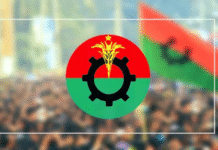 The stage is set. The actors are in motion and the audience is resigned to the fact that their verdict will not matter when the play finally ends. The play will follow its own plot no matter what, but since you have already spent your currency, the only option available to you at this juncture is to sit back and watch the show in utter horror or sheer joy. Such is the state of affairs in Bangladesh today, where the real stakeholders are completely disenfranchised and effectively excluded from the political process. They are just mere spectators to a staged drama blemished with cheap political manoeuvring and counter manoeuvring. However, they are compelled to look on because it is their future that is at stake and they have everything to lose. I am of course talking about the general populace and how in a democratic country they are brushed aside by the very political elites whom they actually empower.
The stage is set. The actors are in motion and the audience is resigned to the fact that their verdict will not matter when the play finally ends. The play will follow its own plot no matter what, but since you have already spent your currency, the only option available to you at this juncture is to sit back and watch the show in utter horror or sheer joy. Such is the state of affairs in Bangladesh today, where the real stakeholders are completely disenfranchised and effectively excluded from the political process. They are just mere spectators to a staged drama blemished with cheap political manoeuvring and counter manoeuvring. However, they are compelled to look on because it is their future that is at stake and they have everything to lose. I am of course talking about the general populace and how in a democratic country they are brushed aside by the very political elites whom they actually empower.
The crisis began with the amendment of the constitution. By unilaterally proceeding with the Fifteenth Amendment the government and its machinery has shown utter disregard towards public opinion. The answer to all our problems lies here. A constitution that is devised to guide the state and protect the citizens of a country was amended without availing the option of a referendum or any other method to ensure public consensus and sentiment. It seems that our political junta in a best case scenario only looks to the public when there is a need to secure their votes. As for the processes and decision making mechanisms on matters that are of grave national importance, they tend to conveniently overlook public opinion because they believe it might act as a hindrance to their agenda. The Awami League government could have ‘legitimised’ their move to amend the constitution if they found a mode to involve the public in the matter. The benefit would have been two-fold for them in this particular case. Firstly, they would have gained political mileage in terms of securing public confidence and support, which is invaluable for an incumbent in Bangladesh. Secondly, they would have left the opposition with no cause at least regarding the abolishment of the caretaker government. However, sensing that the public opinion on such a critical issue might be diametrically opposite to what they want, the government decided to amend the constitution single-handedly thus sacrificing the basic spirit of democracy.
The Awami League also had the opportunity to redeem itself at the next stage of their business when they decided to concoct the scheme of an all-party government to oversee the election period. Predictably, there was no attempt on their part to shape public opinion or even encourage public feedback on the subject yet again. They went about the matter in their own purposeful and authoritarian way, which eventually has created questions regarding the tenure, jurisdiction and capacity of this particular interim government. At best the nature of this government still remains ambiguous and without the participation of the BNP it remains less than an all-party government. While the executive power still remains with Sheikh Hasina as she stays on as the head of the government, the expectation of a level playing field during the election period and the election itself can be effectively ruled out. In other words, the ultimate act of denying the electorates to make their vote count is still looming in the horizon and such an act can prove detrimental for the Awami League. While public opinion has been harshly overlooked and in certain cases perennially suppressed at various stages by the government, the citizens of this country however takes their right to vote very seriously and there can be no scope for compromise at this particular and final stage.
The root of the crisis we are witnessing today cannot be found in two party’s unwillingness to indulge in a dialogue and negotiate. The root lies in the continuous alienation of the general population and their lack of opportunity to participate in the ongoing political process. The government by bypassing public voice at each and every stage of their decision making process regarding the nature of the government that will hold the national election has only lent legitimacy to the voice of their opposition and compounded their own problems. Apart from being the ultimate stakeholders of this country the electorates are also the biggest insurance for any democratic party. If a government agenda stands in opposition to public demand and the government still proceeds to engage the public and hear them out, it still adds a lot of credibility to their intention. Absolutely excluding the voice of the people from the process in fear of rejection is never the answer.
We are witnessing a variety of debates regarding state of the nation and the solution of the current political deadlock. The debates range from hartal violence, need for dialogue to the role of the Election Commission. However, the answer lies within the people. The prevailing cacophony in the political climate characterised by violence and mistrust is simply an outcome of denying the people the right to participate in this whole process. If this not ensured anytime soon, the gloom will not pass.
– See more at: http://opinion.bdnews24.com/2013/11/25/the-core-of-the-matter/#sthash.P2ZF8cSZ.dpuf

The stage is set. The actors are in motion and the audience is resigned to the fact that their verdict will not matter when the play finally ends. The play will follow its own plot no matter what, but since you have already spent your currency, the only option available to you at this juncture is to sit back and watch the show in utter horror or sheer joy. Such is the state of affairs in Bangladesh today, where the real stakeholders are completely disenfranchised and effectively excluded from the political process. They are just mere spectators to a staged drama blemished with cheap political manoeuvring and counter manoeuvring. However, they are compelled to look on because it is their future that is at stake and they have everything to lose. I am of course talking about the general populace and how in a democratic country they are brushed aside by the very political elites whom they actually empower.
The crisis began with the amendment of the constitution. By unilaterally proceeding with the Fifteenth Amendment the government and its machinery has shown utter disregard towards public opinion. The answer to all our problems lies here. A constitution that is devised to guide the state and protect the citizens of a country was amended without availing the option of a referendum or any other method to ensure public consensus and sentiment. It seems that our political junta in a best case scenario only looks to the public when there is a need to secure their votes. As for the processes and decision making mechanisms on matters that are of grave national importance, they tend to conveniently overlook public opinion because they believe it might act as a hindrance to their agenda. The Awami League government could have ‘legitimised’ their move to amend the constitution if they found a mode to involve the public in the matter. The benefit would have been two-fold for them in this particular case. Firstly, they would have gained political mileage in terms of securing public confidence and support, which is invaluable for an incumbent in Bangladesh. Secondly, they would have left the opposition with no cause at least regarding the abolishment of the caretaker government. However, sensing that the public opinion on such a critical issue might be diametrically opposite to what they want, the government decided to amend the constitution single-handedly thus sacrificing the basic spirit of democracy.
The Awami League also had the opportunity to redeem itself at the next stage of their business when they decided to concoct the scheme of an all-party government to oversee the election period. Predictably, there was no attempt on their part to shape public opinion or even encourage public feedback on the subject yet again. They went about the matter in their own purposeful and authoritarian way, which eventually has created questions regarding the tenure, jurisdiction and capacity of this particular interim government. At best the nature of this government still remains ambiguous and without the participation of the BNP it remains less than an all-party government. While the executive power still remains with Sheikh Hasina as she stays on as the head of the government, the expectation of a level playing field during the election period and the election itself can be effectively ruled out. In other words, the ultimate act of denying the electorates to make their vote count is still looming in the horizon and such an act can prove detrimental for the Awami League. While public opinion has been harshly overlooked and in certain cases perennially suppressed at various stages by the government, the citizens of this country however takes their right to vote very seriously and there can be no scope for compromise at this particular and final stage.
The root of the crisis we are witnessing today cannot be found in two party’s unwillingness to indulge in a dialogue and negotiate. The root lies in the continuous alienation of the general population and their lack of opportunity to participate in the ongoing political process. The government by bypassing public voice at each and every stage of their decision making process regarding the nature of the government that will hold the national election has only lent legitimacy to the voice of their opposition and compounded their own problems. Apart from being the ultimate stakeholders of this country the electorates are also the biggest insurance for any democratic party. If a government agenda stands in opposition to public demand and the government still proceeds to engage the public and hear them out, it still adds a lot of credibility to their intention. Absolutely excluding the voice of the people from the process in fear of rejection is never the answer.
We are witnessing a variety of debates regarding state of the nation and the solution of the current political deadlock. The debates range from hartal violence, need for dialogue to the role of the Election Commission. However, the answer lies within the people. The prevailing cacophony in the political climate characterised by violence and mistrust is simply an outcome of denying the people the right to participate in this whole process. If this not ensured anytime soon, the gloom will not pass.
Source: Bd news24










That a political party with long history of struggling for democracy could so blatantly ignore the public who brought them to power with overwhelming majority seemed unthinkable. But perhaps we forgot that the present PM was sheltered in our neighboring country or long six years not just for nothing. We did not see such events as happening now before because then the ruling party boss did not have that majority in the parliament to introduce such an autocratic and authoritarian amendment in the constitution. But now that she can do anything she wants in the absence of conscientious and virile members in the party, things have taken a very different and serious turn. Since the people have been ignominiously ignored in the national decision making through abolishing the referendum clause, what say do the people have there except the hollow and meaningless clause that speaks of people’s sovereignty? Now as we hear that the voters won’t have to show the NID card to the presiding/polling officer, there is wide scope to cast false vote even if the turn-out of voters remains below 25%. After the 15th amendment, the constitution – which many like to call ‘sacred’ – has virtually become a party manifesto at best. But do the common people have that knowledge? This is most unfortunate for the nation that the so-called ‘shushil samaj’ has lost its credibility by being too greedy to resist the temptation of bones and bits thrown by the power party. And there goes a saw: When the educated people of a country are corrupt (and greedy), the nation does not have any future at all.